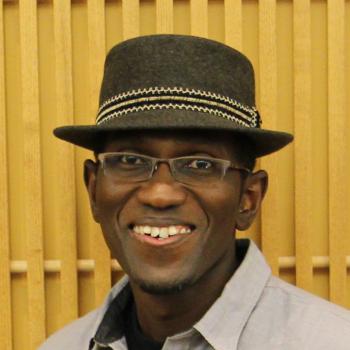Otieno Examines Health Disparities and Human Rights

This semester, Alex Otieno, assistant professor of Sociology, is continuing his long standing concerns around recognizing and promoting the role of culture and institutions in facilitating and, sometimes, resisting social transformation.
He is using his courses and role as co-facilitator for the LOVE Pilot program working group on “Structural Inequality in Health Care: Public Health Disparity, Pandemic Realities” as arenas for these engagements.
“We’re considering disparities in health and health care in Philadelphia and Montgomery Counties focusing on avoidable differences in morbidity and mortality as illustrative case studies of the multifactorial mechanisms of health disparities,” said Otieno about these conversations.
Otieno noted that his work did not always center on health and human rights or global health humanities, policy development (genealogical approaches), and autoethnography. He traces his interest in public sociology and applied anthropology back to his undergraduate studies at the University of Nairobi, where he majored in history and archeology with a focus on cultural resource management. He also finds a connection between his early studies and current scholarship on comparative and historical sociology and sociocultural analyses of the intersection of theory, policy and practice, and social transformation.
Otieno has engaged in global education and public health for several decades. He initially moved from Kenya to New Brunswick, N.J. as a project coordinator for Positive Culture, Inc.’s pilot exchange program in 1996. The role involved public education on African affairs with a focus on Kenya.
His work in public health dates back to 1998 when he coordinated the HIV/AIDS case management uniform access project that served individuals with HIV/AIDS in Philadelphia and surrounding counties. He also served as a community liaison for the Outreach Coordination Center and director of residential services at Project HOME in Philadelphia. His work in that realm has continued with his role as member of Board of Directors for Prevention Point of Philadelphia, a nonprofit organization providing public health services to reduce harm in Philadelphia and the surrounding area.
Otieno said that teaching at Arcadia has afforded him an opportunity to find synergy between his intersecting and overlapping commitments to justice and peace through teaching in the Masters in International Peace and Conflict Resolution. He has been part of the full-time faculty since 2003 and was previously an adjunct professor.
Otieno sees public engagement as a pathway to the elimination of disparities in health and health care. He is currently exploring understandings of health and healing that consider individual stories alongside social and cultural empowerment as potential directions for research on wellbeing and dignity. He uses car seat belts as an example, noting that even when people don’t wear them, socially we know it’s better for us. He observes that “health and wellbeing offer a place for collaborative conversations about a variety of policy issues, because they have political, economic, social, and cultural components and physical manifestations.”
His recent published work includes “Promoting Cultures of Peace: Reflections on SokaGakkai International (SGI) Buddhism’s Contributions to Peacebuilding” published in the Journal of Transdisciplinary Peace Praxis; and “Reggae and Human Rights Discourses in Africa” in Peace Review. His work focusing on COVID-19 pandemic are “COVID-19 Pandemic Response: Using Reflection to Sustain Critical Engagement During a Global Public Health Crisis” published in Practicing Anthropology. Otieno also contributed a chapter about refugee health in COVID-19 to the Society for the Study of Social Problems’ book, Social Problems in the Age of COVID-19, Volume 2.

